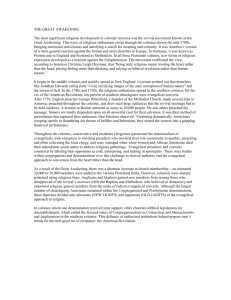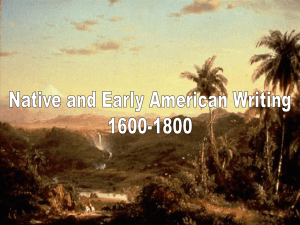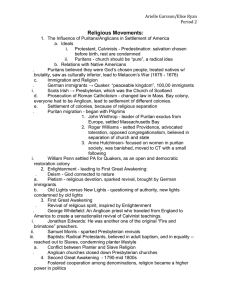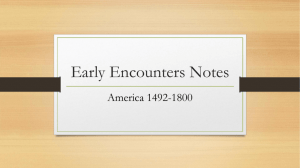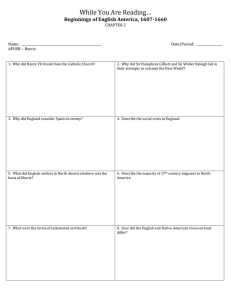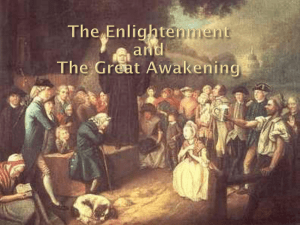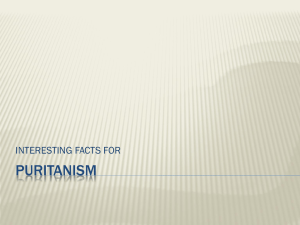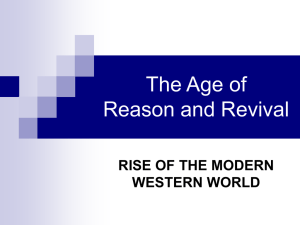Smith, Taylor Hellfire Ch.3-4
advertisement
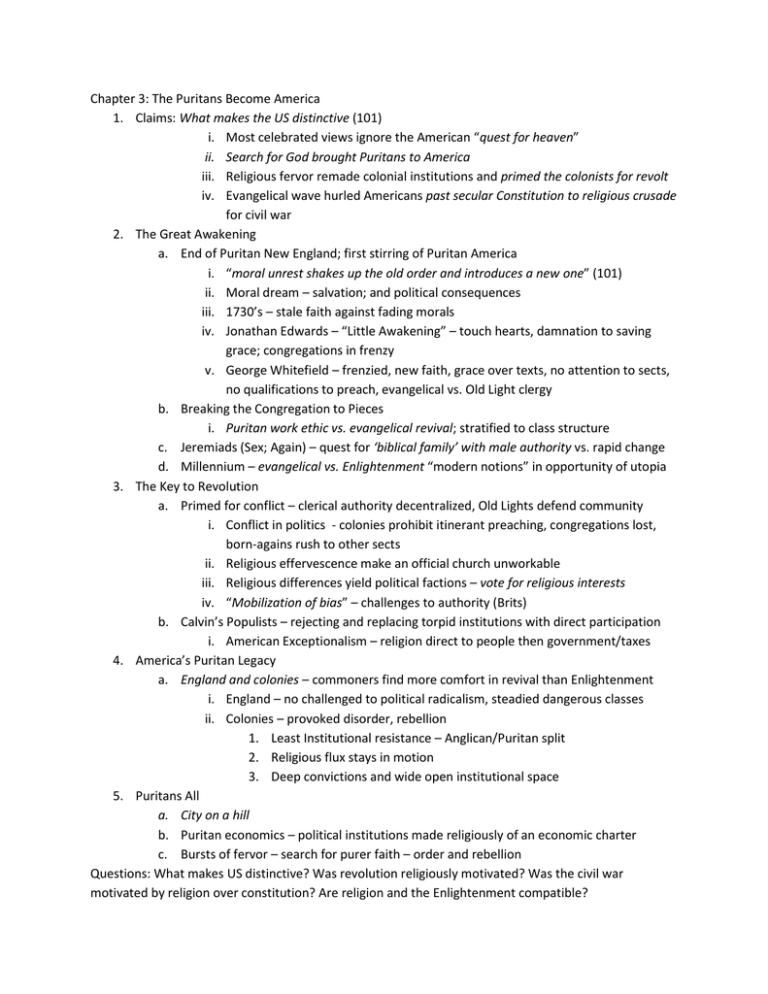
Chapter 3: The Puritans Become America 1. Claims: What makes the US distinctive (101) i. Most celebrated views ignore the American “quest for heaven” ii. Search for God brought Puritans to America iii. Religious fervor remade colonial institutions and primed the colonists for revolt iv. Evangelical wave hurled Americans past secular Constitution to religious crusade for civil war 2. The Great Awakening a. End of Puritan New England; first stirring of Puritan America i. “moral unrest shakes up the old order and introduces a new one” (101) ii. Moral dream – salvation; and political consequences iii. 1730’s – stale faith against fading morals iv. Jonathan Edwards – “Little Awakening” – touch hearts, damnation to saving grace; congregations in frenzy v. George Whitefield – frenzied, new faith, grace over texts, no attention to sects, no qualifications to preach, evangelical vs. Old Light clergy b. Breaking the Congregation to Pieces i. Puritan work ethic vs. evangelical revival; stratified to class structure c. Jeremiads (Sex; Again) – quest for ‘biblical family’ with male authority vs. rapid change d. Millennium – evangelical vs. Enlightenment “modern notions” in opportunity of utopia 3. The Key to Revolution a. Primed for conflict – clerical authority decentralized, Old Lights defend community i. Conflict in politics - colonies prohibit itinerant preaching, congregations lost, born-agains rush to other sects ii. Religious effervescence make an official church unworkable iii. Religious differences yield political factions – vote for religious interests iv. “Mobilization of bias” – challenges to authority (Brits) b. Calvin’s Populists – rejecting and replacing torpid institutions with direct participation i. American Exceptionalism – religion direct to people then government/taxes 4. America’s Puritan Legacy a. England and colonies – commoners find more comfort in revival than Enlightenment i. England – no challenged to political radicalism, steadied dangerous classes ii. Colonies – provoked disorder, rebellion 1. Least Institutional resistance – Anglican/Puritan split 2. Religious flux stays in motion 3. Deep convictions and wide open institutional space 5. Puritans All a. City on a hill b. Puritan economics – political institutions made religiously of an economic charter c. Bursts of fervor – search for purer faith – order and rebellion Questions: What makes US distinctive? Was revolution religiously motivated? Was the civil war motivated by religion over constitution? Are religion and the Enlightenment compatible? Chapter 4: The Wrath of God in Black and White Introduction: “The first African slave stepped onto North American shores in 1619. More than two centuries later, Americans began brawling over abolition. What heated up the argument after all that time? Another religious revival.” 1. Lightning Round the World Shall Fly: The Evangelical Roots of Abolition i. Second Great Awakening characterized by “raucous evangelical spirit” ii. Methodism and Baptism swept the country iii. In the East revival had a less feverish and radical bent. Lyman Beecher said that God-given “inequality of condition” made for the “best possible constitution of society” iv. The author states that “The screaming western itinerants and the grave Yale divines were unwitting partners in a grand American project: bringing a kind of liberal individualism to the nation’s religious life.” v. Preachers pushed for four moral innovations which formed religious democracy 1. They threw aside old-time Calvinism and it’s ideas of predestination 2. Stated that people were responsible for their own souls 3. Pushed religion into the common vernacular 4. Espoused personal disciplines of sobriety, piety, and hard work. 2. Millenium! a. Evangelists on both sides believed in U.S religious exceptionalism b. During this time there was a common view that “Jesus would appear only after humanity had achieved the thousand years of peace and justice”. c. If America was really going to reform the world, virtue had to triumph on every level of society i. Moral agitation from this view started slavery discussion, abolition societies started forming d. Millenial search for God changed American Society in two very different ways i. Fostered individualism, egalitarianism, and faith in historical progress. Seized moral authority from the pulpit and put into ordinary men and women ii. Revival kindled passion for uplifting the neighbors 3. Call Me By the Thunder: African American Religion a. Great Awakening moved black communities in two ways i. Religion taught submission, justified slavery ii. Also sparked outrage and inspired rebellions 1. American rebellions were organized by church members, inspired by Bible metaphors and followed by white efforts to suppress black religion th b. Late 18 century organization of black churches led to these becoming the political and cultural heart of the community. c. White and black religion helped abolitionist effort 4. White Dreams, Black Colonies a. American Colonization Society sought to have black colonists act as “our missionaries in Africa,” that would “lift up the entire continent” i. Moving blacks would spare the country from aftershocks of freedom, what was the actual motive? b. Blacks did not support efforts to be part of colonization
